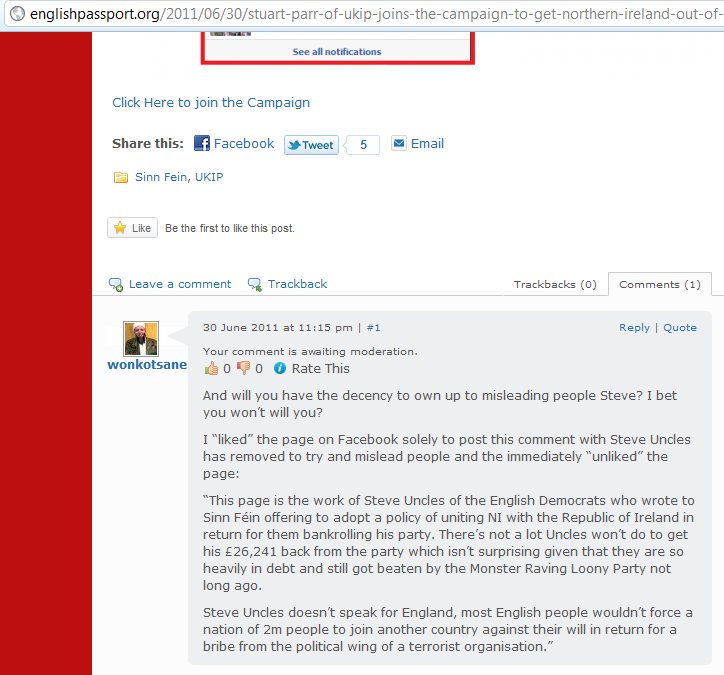 |
| Not to be confused with the idiot Lord who thinks the euro is a success |
Here are some of the best quotes from the interview:
Liddel "The euro itself has been a spectacular success"He was being serious!
Farage "You are in receipt of an EU pension"The difference being that Lord Liddel (like Nick Clegg) is obliged to promote the EU or he will lose his EU pension. Nigel Farage, on the other hand, will never receive a penny from his EU pension because he's devoted his life to trying to bring the whole corrupt organisation down.
Liddel "No I'm not"
Farage "You will be in a couple of years"
Liddel "Nigel, you yourself are in receipt of a salary from the EU"
Liddel "Could I also correct something that Nigel Farage said because I don't think people should be allowed to get away with factual inaccuracies. He says that the eurosceptic party almost won the Finnish election. In fact they only got 21%."Labour came within 7% of winning the 2010 general election and finished 6% ahead of the Lib Dems. Does this mean that Labour didn't come second in the election because of the ConDem coalition?
Farage "Yeah and the winners. What did the winners get Roger? The winners got 1% more. They came within 1% of winning the general election"
Liddel "The the the the the Finnish government is a coalition of parties"
Farage "When will you stop lying to people? There is a huge rebellion taking place across the north of Europe"
Caller "If this isn't a dictatorship then why have we, the British people, not been allowed a referendum?"dic·ta·tor·ship [dik-tey-ter-ship, dik-tey-]
Farage "Quite right"
–noun
absolute, imperious, or overbearing power or control
Liddel "We voted 2 to 1 in 1975 in favour of membership"I'm 33 and I've never had a vote on the EU and the EU didn't even exist in 1975. Nobody has had a vote on membership of a political union.
Caller "We did not vote for this. We did not vote for this dictatorship."
Liddel "It's not a dictatorship"
Caller "I'm a 55 year old woman and I would get on the streets and fight to get rid of this"
Caller "I hate the dictatorship, I hate the freeloading MEPs, all the little niggly things, all these stupid laws they bring in. You can't have so much jelly on a pork pie. What the hell has it got to do with them what I want to put into my body?"Apart from the specific examples that the caller just gave you?
Presenter "Charles Kennedy, why is it a good thing?"
Charles "Because um ... because er ...er"
Caller "Have I blown your legs off? Am I talking common sense?"
Charles "No well I er, I haven't heard a specific example of why it's bad actually"
Farage "The English should be recognised as a country, we need an English Parliament, we need a new relationship with Scotland and Wales, we need to stop massive open border immigration"Is this a proper devolved English Parliament to put England on an equal footing with the rest of the UK or is it the same British Grand Committee of British MPs elected in British constituencies in England that UKIP has previously incorrectly called an English Parliament? If it's the former then this is great news - the opposition to devolution and fascist enforced Britishness policies are the only black marks in what is otherwise the most common sense manifesto of any political party in the country. If it's the latter then Farage really needs to stop misleading people - if he believes in the anti-devolution policy and thinks that people will support it then there's no need to mislead them into thinking it's something else.
The 1997 Group is a group for UKIP members who believe that UKIP should support devolution.


 wonkotsane is an author at Bloggers4UKIP.
wonkotsane is an author at Bloggers4UKIP.
















